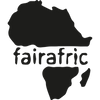
Invest
Climate Loan II
The climate loan
Climate-positive chocolate
Good for the planet & you
As demand is very high, you can find the new climate loan to invest in here.

Bio-Kakao aus Dynamischen Agroforst
In the long term, fairafric can store up to 4x as much CO2 in the soil as is emitted in the entire value chain.
Above a picture of a DAF farm of our partner Serendipalm.
(Copyright: Courtesy of Serendipalm and Dr. Bronner's)
fairafric purchased the first quantities of organic cocoa from DAF in 2024.
Over 500 cocoa families are already participating in the DAF initiative.


The path to climate positivity from fairafric
Climate-positive means that more climate-damaging emissions (e.g. CO2) and impacts are bound than caused.
fairafric's goal is to leave the earth in a better condition than it was before our activities. We are not only concerned with CO2, but also with soil fertility, water storage, the highest possible biodiversity of plants and animals, resilience to climate change and the production of healthy products.
The Dynamic Agroforestry (DAF) cultivation method is based on the knowledge of the indigenous peoples of Latin America and combines many elements of regenerative agriculture or permaculture. The plants are grown in different levels (shrubs, half-stems, etc.) of the forest and different local tree species are planted: Crop trees, biomass trees, shade trees, etc. One of the main objectives is to produce a lot of biomass to improve soil quality. Therefore, not only cocoa is grown, but also other tree and plant species such as cashew, mango, pineapple, etc., which can be processed by fairafric. The production of biomass binds a large amount of CO2 in the long term. Significantly more than is emitted in the entire fairafric value chain.
fairafric emits significantly fewer emissions than other chocolate manufacturers thanks to its own solar-powered factory. Nevertheless, unavoidable emissions (e.g. in logistics) are caused. So far, these have been offset by supporting climate projects in West Africa.
However, our main goal in our own value chain is to leave the environment better than we found it.
That is why fairafric now sources cocoa from a dynamic agroforestry (DAF) project in Ghana. According to initial external analyses by experts, fairafric can bind 4x as much CO2 in the soil in the long term as is emitted in the value chain!
Cocoa is one of the most important cash crops in West Africa. Due to a lack of alternatives and in order to generate an income for the family, an area is often cleared and then as many cocoa trees as possible are planted on the piece of land. After a few years of intensive cultivation, the nutrient reserves in the soil are exhausted and a high use of artificial fertilizers and pesticides is necessary. In Ghana, conventional cocoa cultivation is responsible for the deforestation of 25% of the rainforest.
Deforestation of the rainforest releases large amounts of CO2. The cultivation of monocultures and the massive use of pesticides also worsens soil quality and less water and carbon can be absorbed.
Ongoing climate change, in turn, is leading to drastic changes in weather conditions and an increase in climate disasters. As cocoa trees in conventional cultivation are significantly less resilient, there are already crop failures in conventional cocoa, while yields are hardly affected by regenerative cultivation methods such as DAF, as the plants are healthier and highly resilient.
The cacao tree is a shade plant. This means that the cocoa tree needs larger trees (e.g. palm trees) above it to provide shade and help it to grow and thrive optimally. At DAF, care is therefore taken to ensure that the trees and plants stand next to the cocoa trees, provide sufficient shade and supply the nutrients that the cocoa tree needs. The greatest possible diversity of plants is necessary for this symbiosis. This symbiosis promotes biodiversity, increases the yield per tree, increases soil fertility and the water storage capacity of the soil and the biomass trees actively store CO2 in the soil.
In initial analyses, external experts have determined that fairafric can store up to 4x more CO2 in the
soil in the long term than is emitted in the entire value chain thanks to the
storage of biomass in the soil.
With our new Visitor Center, we also want to give our customers the opportunity to get an in-depth look at our operations. The factory visit will be combined with a visit to our farmer communities, all in one day! Unique in the world!
1. higher cocoa premium
fairafric pays farmers a climate premium of 250$/tonne in addition to the highest organic premium (792$/tonne) in West Africa. The cocoa families therefore receive 1,042$ per tonne of organic cocoa from DAF. This is a multiple of the regular organic premium (300$/tonne) or other certifications such as Fairtrade (240$/tonne).
2. diversification of income
The cultivation of several crops helps to diversify income and makes it possible to earn an income outside the cocoa harvest season.
3. better soil quality & resilience to climate change
By improving soil fertility and other benefits of DAF for the soil, the plants become significantly stronger and more resistant to environmental influences. In addition, the soil quality increases the quality and yield of the fruit. This means that the land can be cultivated naturally in the long term and sustainably.

Our chocolate factory has been located in rural Ghana since 2020
It is the world's first solar-powered factory for organic chocolate
Fairafric products can be found on 5 continents and demand continues to grow rapidly.
Frequently asked questions about fairafric
2015
First official meetings between Hendrik and cocoa farmers and cocoa workers in Ghana.
2016
First Kickstarter campaign
Foundation of fairafric GmbH
First production
2017
Second Kickstarter campaign
Successful organic certification of the entire value chain
Switch from 20g bars to 100g bars
2018
Third Kickstarter campaign
Climate-neutral certification (both chocolate and company)
Establishment of the fairafric Foundation, which holds shares in fairafric GmbH for cocoa farmers
First Seedrs campaign (Seedrs enables start-ups to gain their customers as shareholders), in which 264 private individuals have invested in fairafric
2019
Decision to build a larger chocolate factory on our own: On the land of the cocoa cooperative we work with, in the rural region where the cocoa beans also grow.
Increase in shareholders to 360; Ludwig Weinrich and claro fairtrade AG join the fairafric family
Winner of the Lammsbräu Sustainability Award
2020
Construction of our new chocolate factory in Amanase. Record-breaking construction time of 5.5 months from the ground-breaking ceremony to the first bar.
2021
fairafric GmbH becomes fairafric AG. Within 3 days, the first convertible bond with 990,000€ is fully subscribed and within 24 hours the first share issue of fairafric for 999,589.80€ is sold out. fairafric buys 250 tons of cocoa beans for production in 2021 and pays the highest premiums in West Africa. fairafric also chases from record to record in 2021. fairafric more than doubles the previous year's sales and produces over 2,000,000 bars of chocolate.
2022
After an outstanding first quarter in 2022, the macroeconomic shocks
prevent further growth for fairafric. However, while many other brands are struggling with
declining sales and discontinuations, fairafric remains present in all
markets and is gaining strong market share.
fairafric also reaches the final of the German Sustainability Award 2022 and is recognized as one of the most sustainable companies in Germany.
2023
fairafric enters the B2B business with its own line of chocolate drops. The chocolate drops are used by large bakeries and cookie manufacturers, among others, in their products and the line is already running around the clock after a short time.
fairafric launches a vegan cashew-based milk chocolate on the market, which is a complete success and becomes one of the best-selling products.
fairafric receives its first major orders for contract manufacturing and starts production for its first customer in the USA.
2024
fairafric sources the first smaller quantities of cocoa from Serendipalm Dynamic Agroforestry. The first phase of the journey to climate positivity is successfully completed.
Demand from major customers grows rapidly, creating over 100 new jobs and, by the end of the year, more than 200 people are employed by fairafric Ghana.
The owners of fairafric are the founding team, our 1244 shareholders from the customer base, Ludwig Weinrich GmbH, claro fair trade AG, Third Way Capital (a Ghanaian impact investor) as well as our team and the cocoa farmers of our partner cooperative.
In 2025, we will purchase cocoa for over 2.0M€.
This cocoa will be sourced from the dynamic agroforestry project. To ensure this, fairafric provides the pre-financing for the harvest and pays the highest organic premium in West Africa to our cocoa families.
In addition, fairafric wants to promote the planting and conversion of further farms to DAF and increase the yields of existing DAF farms.
Every euro invested binds CO2 in the soil in the long term and creates jobs in Ghana!
We expect to be operating profitably from the end of 2025. When exactly this will happen depends heavily on the development of the global market price for cocoa.
With our new Visitor Center, we also want to give our customers the opportunity to gain an in-depth insight into our operating processes. In 2024 alone, more than 1,000 people visited us. The factory visit is combined with a visit to our cocoa communities, all in one day!
Unique in the world!

Frequently asked questions about the climate bond
For every 1,000€ you lend us today, you will receive 65.50€ in interest every year.
Repayment begins in March 2029 and is made in 10 installments (2 payments per year in March and September) until the end of the term (September 2033). From March 2029, you will therefore receive a constant payment consisting of interest and repayment (an annuity) of 120.48€ per 1,000€ invested.
In the end, you will receive 1,377.23€ back for every 1,000€ you invest.
The campaign will run until 99,000€ have been subscribed.
The first climate bonds from fairafric were sold out within a short time. We are therefore assuming that full subscription will be achieved quickly. We process the subscriptions according to when they are received.
We do not share information about our investors with any tax office. You simply declare the interest received on your tax return.
If you want to lend us money interest-free, write us a short e-mail at . Of course, this is also possible and supports us even more.
As the loan is unsecured, you may lose your entire investment.
Therefore, never invest money that you absolutely need.
What is the difference between DAF and conventional cocoa
The management team in Ghana
Michael Marmon-Halm
Managing Director Ghana
Michael has more than 12 years of experience in the cocoa industry in Ghana and has studied quality management.
Griselda Esther Ossei
Chief of Staff
Griselda has extensive experience in accounting and supports the strategic planning and implementation of the fairafric brand, marketing, HR and operations in Ghana.

Henry Langma
Operations Manager
Henry is in charge of operations (production, technology, logistics) at fairafric and has already successfully set up several cocoa processing factories in Ghana.
Audrey Marmon-Halm
Quality Manager
Our Quality Manager Audrey has 11 years of professional experience in quality control and quality assurance.
The management team in Germany











